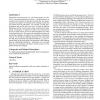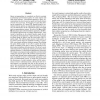1126 search results - page 80 / 226 » Personal Navigating Agents |
81
Voted
HRI
2006
ACM
15 years 5 months ago
2006
ACM
We present a method of grounded word learning that is powerful enough to learn the meanings of first and second person pronouns. The model uses the understood words in an utteran...
CIKM
2001
Springer
15 years 4 months ago
2001
Springer
The success of personal information agents depends on their ability to provide task-relevant information. This paper presents WordSieve, a new algorithm that generates context des...
CIKM
2005
Springer
15 years 5 months ago
2005
Springer
Information retrieval systems (e.g., web search engines) are critical for overcoming information overload. A major deficiency of existing retrieval systems is that they generally...
ICRA
2000
IEEE
15 years 4 months ago
2000
IEEE
Potential function approaches to robot navigation provide an elegant paradigm for expressing multiple constraints and goals in mobile robot navigation problems 9]. As an example, ...
113
click to vote
AAAI
2008
15 years 2 months ago
2008
Query recommendation is considered an effective assistant in enhancing keyword based queries in search engines and Web search software. Conventional approach to query recommendati...


